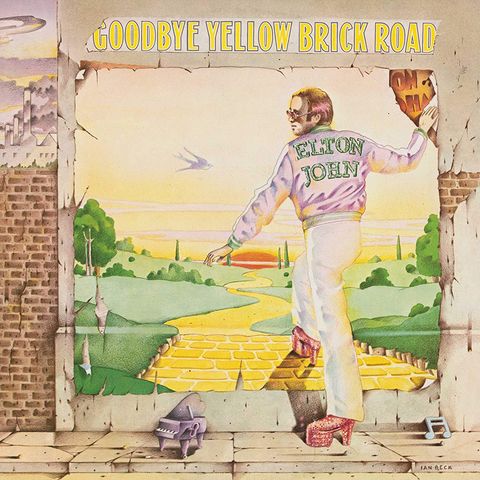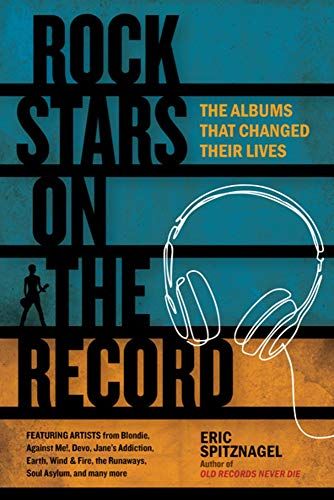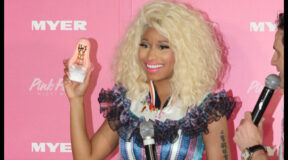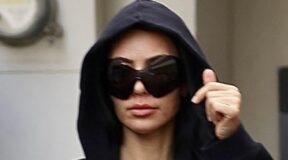The following excerpt is an exclusive interview from Rock Stars on the Record: The Albums That Changed Their Lives, by Eric Spitznagel, an author of more than 10 books and a contributor to Rolling Stone, Vanity Fair, The New York Times, and Men’s Health.
His new book (out February 23) features music all-stars—including musicians such as Mitski, Mac Demarco, as well as members of Blondie, The Runaways, and Against Me!—all breaking down first-hand memories and accounts of some of their very favorite albums. Albums that made them who they are. Albums that changed the course of their lives.
The below interview finds Spitznagel in conversation with one of the masters of his craft, Weird Al Yankovic—himself a prolific and legendary artist, with 14 hit studio albums to his name—as the humorous hitmaker and accordian expert discusses the album that he credits with changing his life: Elton John’s Goodbye Yellow Brick Road.
—Evan Romano
Weird Al Yankovic, accordion-playing pop music parodist from Lynwood, California, who got his big break at age sixteen in 1976 when he handed a cassette of his polkaheavy comedy songs to LA deejay Dr. Demento.
It launched a career that’s led to twelve million albums sold, five Grammy awards, and hit parodies that were sometimes more popular than the originals, like “Eat It,” “Like A Surgeon,” “Smells Like Nirvana,” and “Amish Paradise.” The New York Times has called him “A completely ridiculous national treasure, an absurd living legend.”
THE ALBUM: Elton John, Goodbye Yellow Brick Road (1973)
Do you remember your first record?
The first rock album I ever purchased at a record store with my own money? I’m pretty sure it was Goodbye Yellow Brick Road. I had picked up a single of “Classical Gas” a couple years earlier, and I think maybe I had bought an early George Carlin album, as well. But this was my first contemporary rock album.
Where’d you get the money to buy it?
I’m not really sure. I don’t think I was getting an allowance and I didn’t have a job at that age, so it’s entirely possible my parents actually bought it for me. But knowing how tight money was, it was a big deal for me to request that they purchase something as extravagant as a record album.
They weren’t big record collectors?
Oh no. It was kind of a big deal in my family to actually buy something as extravagant as an LP. My parents were lower middle class—they lived through the Great Depression—and my mother honestly couldn’t understand why I needed to own an album as opposed to just waiting around for my favorite songs to be played on the radio.
What songs from Yellow Brick Road were you hearing on the radio that piqued your interest?
The hits were getting a lot of radio play, of course—I was particularly fond of “Saturday Night’s Alright For Fighting.” But what really sealed the deal for me were the deeper cuts that I was hearing on the local AOR station. Rockers like “Grey Seal,” “All the Young Girls Love Alice,” and particularly “Love Lies Bleeding.”
Really? The one with all the death symbolism?
Oh, yeah. I loved the grandiose chromatic guitar runs in that song’s intro—and the big breakdown in the middle with the piano, flutes, and kick drum. It was beautifully recorded, and it rocked hard.
It’s a pretty grim song. “Everything about this house/ Was born to grow and die.” Was there something in those lyrics that spoke to you? Or was it just the antithesis of your suburban teenage existence?
This probably sounds strange coming from a person whose career revolves around lyrics, but I tended not to really listen to the words to songs. I didn’t think of “Love Lies Bleeding” as being grim—I just loved it because the music was so good.
How old were you when you bought the album? The record came out in 1973, so you were what…thirteen, fourteen?
I couldn’t swear to it, but fourteen is a very good guess. I didn’t get the album immediately, so maybe 1974?
Did you listen to it alone in your room, or was it something you wanted to share with others?
I guess I mostly listened to it by myself, on the record player in my room. But it was a small house, so I remember turning the volume way down whenever there were “objectionable” lyrics. I stared at the album art a lot while listening to it, but I’m sure I did other things, too.
Let’s talk about the album cover. It’s a weird cover.
So weird.
What went through your head when you looked at it? The platform shoes, the pink jacket, the Dame Edna glasses. Elton looks like some kind of disco superhero. What did you make of it?
I just thought that was how rock stars were supposed to dress. Seemed perfectly appropriate to me.
A few things that always bugged me. If the title is about saying goodbye to the yellow brick road, why is he depicted on the cover walking towards it? And he’s walking into a poster? What do you think that means?
I’m sure Elton’s still very upset about that, but I’m guessing a few million copies were already printed by the time they spotted that egregious error.
And what’s going on with that tiny piano? Did you have any theories?
I just assumed that was the instrument played by New York’s famous Piano Rat. No proof of that, though.
Did you listen to John’s songs and think, “I could do that?” Or did it feel like magic?
I probably gravitated toward Elton because he played the piano, and since I played the accordion—the right half of which is a piano keyboard—it was fairly easy for me to emulate him. I was able to figure out all the chords, write them down, and play every song on the album by ear. After playing along [to] the album a few hundred times, I was even able to delude myself into thinking that the accordion was a perfectly acceptable rock ’n’ roll instrument.
Your parents bought you that first accordion, right?
That’s right. And they paid for my accordion lessons.
“This probably sounds strange coming from a person whose career revolves around lyrics, but I tended not to really listen to the words to songs. I didn’t think of “Love Lies Bleeding” as being grim—I just loved it because the music was so good.”
So, you’re in this small house, playing this album filled with songs about prostitutes and bar fights and Jamaican jerk-offs. What did your parents think when they heard you trying to recreate these songs from your bedroom? Is that what they had in mind?
I don’t think they had any kind of master plan for me vis-à-vis the accordion, but they didn’t seem to mind anything that I felt like playing.
Which song in particular did you wear out? If we found your old copy of Yellow Brick Road, is there a track or album side that would be especially well-worn?
The entire album got pretty even wear, but I guess “Funeral For a Friend/ Love Lies Bleeding” received the most groove damage. Upon repeated listening, I figured out how to play “Funeral For a Friend” on the accordion, and was able to entertain/annoy people with it in the dorms during my freshman year in college.
When you hear the album again, what comes to mind? Do you remember a specific time and place? Is it a nostalgic moment, or does the music mean something different to you now, as an adult and working musician?
Of course I still love it as a fine collection of music, but yes, for better or worse, it’s sometimes hard to separate my appreciation from sheer nostalgia. Whenever I hear a track from that album, part of me turns fourteen again.
Source: Read Full Article







